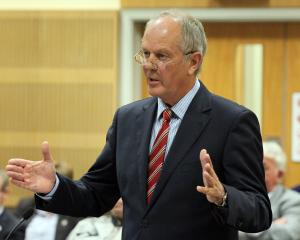
It deals with issues which politicians of various hues like to huff and puff about in Opposition but become strangely silent about when they have the baubles of office.
The danger of putting transparency questions forever in the too-hard-basket is that over time scandals small and large chip away at our confidence in our public institutions.
We like to think of ourselves as a country largely free of corruption. We have often been at the top of Transparency International’s Corruption Perceptions Index, although we slipped from second to third last year.
Former attorney-general Chris Finlayson says in the foreword to the report, corruption is an insidious cancer.
"It is not enough for democracies like ours to pay lip service to principles of transparency and steps which need to be taken against corruption."
The report deals with the lack of regulation for political lobbying, political donations and election funding, access to official information, foreign bribery and the need for a register of beneficial ownership of corporate entities.
Concerns about political lobbying have increased in frequency with the advent of the coalition government.
Its enthusiasm for economic growth and fast-tracking of infrastructure projects, using public-private partnerships, rolling back smoke-free legislation, gun law reform, and Pharmac reform which might require it to be cosier with pharmaceutical companies, lends urgency to change in this area.
If politicians want us to believe "there is nothing to see here", the only way to do that is to have proper rules around transparency so we can judge for ourselves.
As we have said before, nobody would want to deny businesses being able to put their point of view to policy-makers, but we should know who they are and whether they have ease of access not available to those with a contrary view.
Nothing has been done to address the issue of the revolving door, where political insiders, either members of Parliament or senior public servants, can move directly from their public roles to become lobbyists in the private sector.
An Organisation for Economic Co-operation and Development (OECD) study of 41 countries found New Zealand was one of only nine which did not have a stand-down period.
Despite much noise about this issue last year, and finance minister Nicola Willis’ earlier support for a 12-month stand-down, there has been no movement on this. (The report recommends three years.)
Earlier this year Ms Willis was also expressing support for a mandatory code of conduct for lobbyists, but we have heard nothing on that from her colleague Justice Minister Paul Goldsmith.
The voluntary code developed by the Ministry of Justice with the help of lobbyists, was described by Ms Yasbek as "close to useless" because it will only reveal the activity of more ethical lobbyists.
On the Official Information Act, among the report’s recommendations are a call for penalties for non-compliance, something our mates across the Ditch already have.
Reform of the 42-year-old Act has been talked about for years. However, this government’s apparent failure to castigate Associate Health Minister Casey Costello for her office’s appalling handling of two OIA requests which drew damning criticism from the Chief Ombudsman recently, does not suggest this will be a priority area.
Similarly, given the millions of dollars the coalition partners received in donations at the last election, we would be surprised if they had any enthusiasm for changing rules there.
It would be great, if as Ms Yasbek suggests, we could tackle all of these transparency issues now rather than wait for a major crisis to force us to.
We are not holding our breath.











